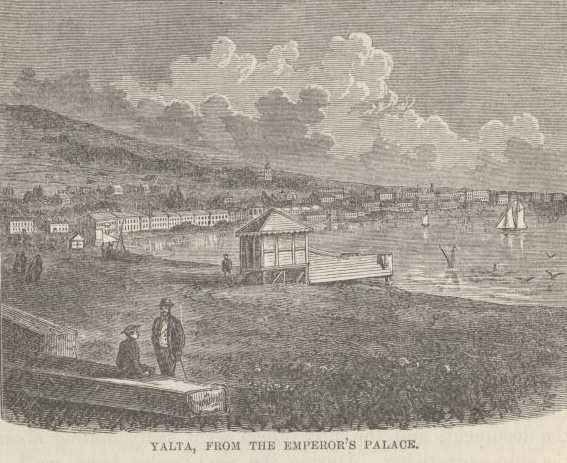We anchored here at Yalta, Russia, two or three days ago. To me the place was a vision of the Sierras. The tall, gray mountains that back it, their sides bristling with pines—cloven with ravines—here and there a hoary rock towering into view—long, straight streaks sweeping down from the summit to the sea, marking the passage of some avalanche of former times—all these were as like what one sees in the Sierras as if the one were a portrait of the other. The little village of Yalta nestles at the foot of an amphitheatre which slopes backward and upward to the wall of hills, and looks as if it might have sunk quietly down to its present position from a higher elevation. This depression is covered with the great parks and gardens of noblemen, and through the mass of green foliage the bright colors of their palaces bud out here and there like flowers. It is a beautiful spot.

Page 423-4 The Life of Mark Twain: The Early Years, 1835-1871
When the pilgrims arrived, Sam’s proclamation was read aloud by the local American consul and the czar welcomed his guests in English. Louisa Griswold was awestruck: “I could not realize that we were being entertained by a ruler of more than seventy-five millions of people.” Dan Leary's motive in proposing a royal visit was soon apparent: he wanted to sell the Quaker City to His Highness. According to James, Leary with “his mouth wide open, showing his teeth, and putting his hand on his shoulder,” buttonholed Aleksandr like a used-car salesman, ‘standing square before him with the mouth wide open” to “show his teeth,” thrice inviting him to tour the ship the next day so that he could figuratively kick the tires. As Leary crowed to his brother, “Of course I was king pin, and walked about on the most familiar footing with the Emperor and Empress.” Reeves Jackson, for one, was dismayed. How would the excursionists have returned to the United States had Leary disposed of the Quaker City in Yalta? “It might have become more serious than amusing,” he wrote, if the czar had taken the bait. “In such a case the passengers would have been more effectually sold than the ship.” In Sams view, “We were to sell the ship and then walk home, I suppose.” In fact, according to Charley Langdon, in the event he disposed of the vessel Leary planned to land passengers at Genoa, Valencia, or Gibraltar and give each of them “enough money to procure a first class passage ‘home,’” After he was stalked by Leary for fifteen minutes, the czar disappeared; and after two hours, the party moved to the cottage of Grand Duke Constantine, the czars oldest son, who was traveling in Denmark, and then to nearby Orlander Palace, the summer home of Grand Duke Michael, the czar’s brother. There they enjoyed “a chatty, sociable tea-party.”